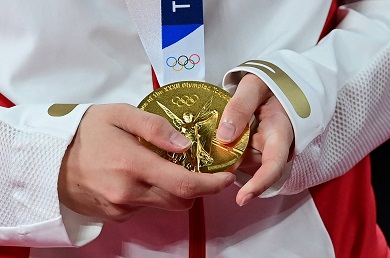It’s about everything – and nothing …
As I begin my post today, reflecting upon some of the issues thrown up by the Olympics currently belatedly taking place in Tokyo, I’m conscious that I’m sailing gingerly into choppy and potentially hazardous waters and also simultaneously at significant risk of losing my thread or even contradicting myself along the way.
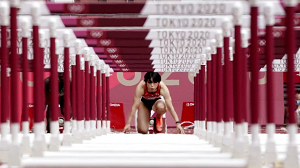 Nevertheless, needs must.
Nevertheless, needs must.
The Olympics hold a special place in the affections of the world precisely because they represent a theoretical ideal that all humans can buy into: a festival run on a four-yearly cycle at which “the best of the best” in every sport/game/pastime compete on even terms to decide he or she who is supreme on a given day.
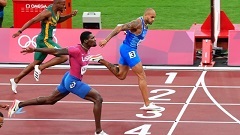 First problem – what is the definition of “even terms”?
First problem – what is the definition of “even terms”?
Different races have different builds that inevitably give them certain advantages in certain events – e.g. sprinting tends to be dominated by those with powerful physiques, long distance running by those of thin, wiry, build. High-jumping by those who are stringy, springy, bean-poles … and discuss, hammer throwing and shot putt by relative behemoths.
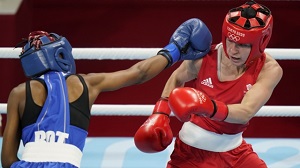 Those who live – or can afford to train – at altitude tend to have a lung-capacity advantage.
Those who live – or can afford to train – at altitude tend to have a lung-capacity advantage.
Western first world countries tend to be able to afford – and socialist/communist countries who recognise the prestige and influence that Olympic success can bring them somehow find the means to pay for – the systematic “spotting of elite potential” (and then the depth and intensity of training) required to take competitors through to potential Olympic glory.
The chances of lesser countries – or rather, those without such advantages – producing Olympic legends are slighter than that of finding a needle in 10,000 acres of haystacks each set two metres apart from the next.
 Then there’s the capacity for – and likelihood of – both systematic and “one off” cheating.
Then there’s the capacity for – and likelihood of – both systematic and “one off” cheating.
Never mind Per Ardua As Astra (English translation from the Latin: “Through Adversity To the Stars”) the inspiring motto of the Royal Air Force that references the extreme grit and effort required to achieve excellence – or even founder of the modern Olympics Pierre de Coubertin’s own clarion call for integrity and principle – “The important  thing in life is not the triumph but the struggle, the essential thing is not to have conquered but to have fought well” [sometimes misquoted as “The important thing not to have won but to have taken part”] – the history of sport (I’m not picking exclusively upon the Olympics here) is littered with participants who have been prepared to step over the line between “seeking every advantage” and “being dishonest” in the cause of achieving immortality.
thing in life is not the triumph but the struggle, the essential thing is not to have conquered but to have fought well” [sometimes misquoted as “The important thing not to have won but to have taken part”] – the history of sport (I’m not picking exclusively upon the Olympics here) is littered with participants who have been prepared to step over the line between “seeking every advantage” and “being dishonest” in the cause of achieving immortality.
It’s been mentioned before, but – after over 50 years of systematic drug abuse by the former “USSR”, now Russia, not to mention other former communist Eastern European countries – the attendance at the Tokyo Olympics of the “Russian Olympic Committee” team, now sitting in the top five of medal-winning “countries”, is a travesty of everything the Olympics does or should stand for.
A first-time feature – or so it appears – at Tokyo is (perhaps only to be expected in a 21st Century that seems to champion diversity and “wokeness” over everything) the latest fashionable trait of athletes revealing their mental frailties and struggles.
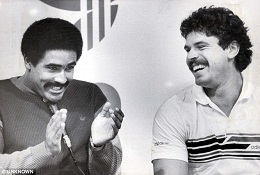 All sports fans love a sentimental back story – especially one involving hardship, poverty, chronic illness or injury – but please let us apply a proper sense of perspective.
All sports fans love a sentimental back story – especially one involving hardship, poverty, chronic illness or injury – but please let us apply a proper sense of perspective.
Those of us of a certain vintage can remember, back in the day when Britain’s Daley Thompson and Germany’s Jurgen Hingsen vied year after year for decathlon supremacy. Quizzed by a journalist as to why he trained even on Christmas Day – Thompson replied deadpan “Because Jurgen doesn’t” – and meant it.
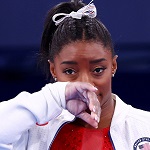 So far this Olympic term we’ve had Simone Biles confessing her mental issues, Dina Asher Smith breaking down during an interview after an “injury” withdrawal … even breast-stroke first superstar Adam Peaty yesterday announcing that he was now taking six months off to recover from the strain of Olympic competition … and now overnight GB sprinter Adam Gemili making it no further than four strides away from his blocks in his 200 metre heat, apparently due to a hamstring “twinge”.
So far this Olympic term we’ve had Simone Biles confessing her mental issues, Dina Asher Smith breaking down during an interview after an “injury” withdrawal … even breast-stroke first superstar Adam Peaty yesterday announcing that he was now taking six months off to recover from the strain of Olympic competition … and now overnight GB sprinter Adam Gemili making it no further than four strides away from his blocks in his 200 metre heat, apparently due to a hamstring “twinge”.
 It’s becoming contagious – this week Ben Stokes has announced his withdrawal from elite cricket “until further notice” for similar reasons.
It’s becoming contagious – this week Ben Stokes has announced his withdrawal from elite cricket “until further notice” for similar reasons.
It’s been a strange Olympics, this one – and not just because of the lack of crowds and Covid-19 issues that have caused me to ditch the habit of a long lifetime and deliberately avoid spending my days watching the wall-to-wall coverage on offer.
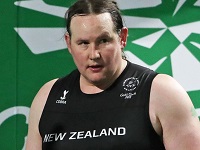 I’m not even going to mention the sorry tale of Kiwi transgender weightlifter Lauren Hubbard who yesterday (as I saw on a BBC News highlights package) failed to complete a single lift on her Olympic debut.
I’m not even going to mention the sorry tale of Kiwi transgender weightlifter Lauren Hubbard who yesterday (as I saw on a BBC News highlights package) failed to complete a single lift on her Olympic debut.
Taking my cue from the “woke” perspective, if the Olympics is going to allow former males to compete as transgender women, why not go a whole hog or two further?
Why not have separate events for “transgender athletes”? Or, if that would be unfair to women who identify as “transgender men”, why or earth in the future don’t they have separate events for (1) those who shift from male to transgender, and then (2) those who shift from being female to transgender?
And while we’re at it, let’s go further. For example, in my pomp I might have been an Olympian hero if – as arguably should have been the case – there had been separate events for those who had the misfortune to be born left-handed?
 Running anti-clockwise around a 400-metre track severely disadvantages those of us with this handicap.
Running anti-clockwise around a 400-metre track severely disadvantages those of us with this handicap.
(I might point out here that before WW1 the Oxford University athletics track was 330 yards in length and races upon it were run in a clockwise direction).
And finally – why not separate events for those born with ginger hair? They’ve been discriminated against for millennia …

